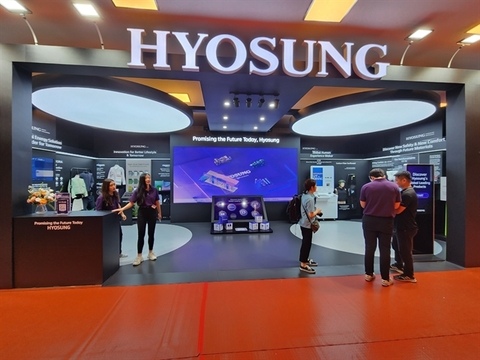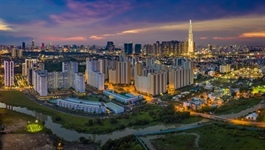Korea-Vietnam Partnership Fair to boost bilateral trade
Korea-Vietnam Partnership Fair to boost bilateral trade
Viet Nam offers abundant business opportunities for Korean companies thanks to its political stability, fast economic growth, and cultural similarities to the Republic of Korea (ROK).

The exhibition booth of Hyosung Corporation. Around 120 Korean companies, including nine heavyweights, showcased their products at the event. — VNS Photo Le Viet Dung |
This was a remark by Tran Thi Hai Yen, Head of the Korea Trade-Investment Promotion Agency (KOTRA), at the Korea-Vietnam Partnership Fair on Thursday.
She said Korean companies see Viet Nam as a market with significant untapped potential as Vietnamese consumers are shifting their buying patterns towards a more diverse range of products.
About 120 Korean companies, including nine heavyweights, were showcasing their products at the event. KOTRA aimed to help those companies strike deals with more than 300 Vietnamese companies searching for new suppliers.
"Around 1,000 deals between the Korean and Vietnamese companies will be negotiated at the fair today," said Yen.
SaeFarm, a Korean company that provides farmland analysis based on AI-powered satellite images, had an exhibition booth in the corner.
SaeFarm CTO Kang Jun Seo told Viet Nam News that his company attended the fair to look for Vietnamese clients. SaeFarm wants to do business in Viet Nam because the country has a fast-growing agricultural sector.
"Viet Nam has a larger agricultural market than the ROK. We attempt to enter the Vietnamese market to expand our customer base," said Kang Jun Seo.
The CTO believed that AI-powered satellite images would soon rise to prominence since the EU's new regulations on deforestation-free products require geographic information on agricultural land plots.
Another Korean company present at the fair was SMSBio, which sells pine needle distilled concentrate oil.
SMSBio CEO Lee Il Gyun told Viet Nam News that his company first established in Viet Nam seven years ago. Despite the global economic downturn, its business in the country kept flourishing thanks to the local demand for herbal supplements.
"We will expand our business by opening more branches in Viet Nam," said Lee Il Gyun.
The CEO also said Vietnamese administrative procedures had been overhauled in favour of foreign investors, especially Korean investors, in recent years. Some of his new products obtained permits from Vietnamese authorities last year.
Vu Thi Thu was among the Vietnamese entrepreneurs on the lookout for partners yesterday. Thu is the CEO of FASO Vietnam CO LTD, an importer of Korean products for the last 10 years.
Thu told Viet Nam News that ROK-made products won favour with Vietnamese consumers because ROK Government had always been active in promoting the products abroad through trade fairs and favourable tax policies.
Many products FASO imported from ROK were tax-favoured by ROK Government, including garimi roasted seaweeds, which had been made exempt from duties.
Hong Sung, Chairman of the Korean Chamber of Business, said Viet Nam provided a fertile business ground for Korean companies owing to the close cultural affinity between the two countries.
In fact, Viet Nam remained ROK's third-largest trade partner, behind only the US and China. The third position, as the chairman said, "speaks volumes about the special nature of the Viet Nam-ROK relationship".
Hong Sung revealed that the two countries were aiming to reach US$100 billion in accumulated bilateral trade this year and $150 billion by 2030. He said Vietnamese agricultural, forestry and fishery exports hold the key to a more balanced trade relationship.
He cited the current visa policy as a major hindrance to Korean companies in quest for business opportunities in the country. He said a more relaxed visa policy would serve the country well in terms of foreign investment.
Co Han Deog, Director of the Korea International Cooperation Agency (KOICA), said his agency would be eager to assist Viet Nam in management enhancement, quality control, and education and training with regard to mega projects.
"In light of the presidential visit to Viet Nam, the ROK will initiate a loan of $4 billion for infrastructure development in the country," said the director.
KOICA would follow suit with a non-repayable package of $30 million, aimed at innovation, science, and technology. It was also working on projects to improve the competitive advantages of Vietnamese agricultural products.
Tran Hai Linh, Chairman of the Vietnam-Korea Businessmen and Investment Association, said his association had launched scores of cooperative programmes to facilitate the investment flows from ROK to Viet Nam.
The programmes bore fruits with more business opportunities available for Vietnamese small- and medium-sized enterprises in recent years.
"The comprehensive strategic partnership between the two countries is a milestone laying the grounds for further business cooperation," said Linh.
The Korea-Vietnam Partnership Fair was organised on the sidelines of the visit by ROK President Yoon Suk Yeol to Viet Nam from 22 to 24 June.


















